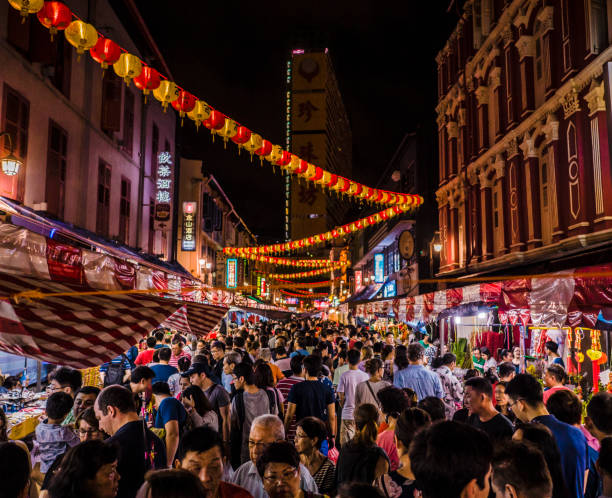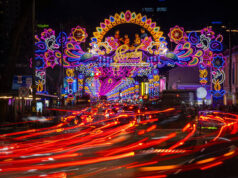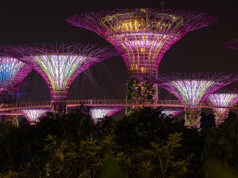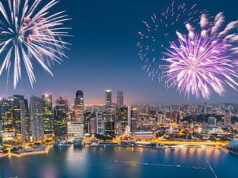Why Nights are Different
Entering a modern art museum singapore at night is unlike daytime visit. The mood changes in a heartbeat. Typical mass is in a film of gin, lighting is altered and an air of intimacy settles in. Walls that are dry in the day have a halo in the spotlights. Each noise, every footstep, whisper, and even air conditioner seems so turned up. Night exhibitions turn the museum into a museum during the daytime and into a playground at night.
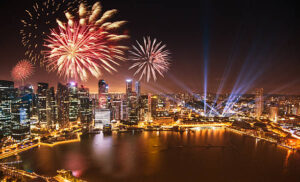
Night Exhibitions as A New Stage
Lighting Is Part of the Art
Artificial lighting has more than the capability to lighten the dark. It changes perception. Where pictures were dull in the open air, they can be brought out under orange lights. Casting longer, more dramatic shadows are sculptures. Their video installations contrast against the darker environments and draw audiences further into their environments. Night itself becomes a co-curator, with the aim of transforming the experience that visitors have of every piece.
Late Working, Late Talking
Slow pace is encouraged by the late exhibitions. Tourists are not in a hurry to visit and see a gallery on time. They walk, stop and loiter. Discussions are easy to participate in, as there is more of a wait time to think over what a piece evokes. The detachment of night encourages honesty, and it makes interacting with a stranger seem normal and not contrived.
Special Events That Reconceptualize Museums
Music in the Art
Live performance in many modern art museums is another experimentation. Atriums are often filled with jazz quartets, electronic sets or other traditional instruments as visitors pick through them. The experience produces layers: the visual, the auditory and the emotional. The very structure of the building is fragmented as part of a performance as it is enhanced with sound and light.
Screenings of Films In The Galleries
We have some nights when walls go black and turn into a movie screen. Pictures or even documentaries are played in rooms that traditionally house paintings. Being in a cinema, amongst installations enhances the interaction between media. It is not mere viewing of a movie but is the process of viewing in a conversation with the art the movie will be surrounded by.
Interactive Evenings
Hands-On Workshops
Evenings may include a workshop that is meant to cater to adults that will not be able to attend during the day. Experiments with digital media or printmaking or abstract painting can enable visitors to roll up their sleeves. These are not only about creating art but also about common sense about process, technique and the sloppy pleasure of creation.
Escorted Tours with a Difference
Normal tours of museums are transformed into something totally different at night. Candlelit traipses or flashlight tours labeled by curators or out-of-town artists sometimes take place. The low-key mood allows inquiries and jokes that other groups would not casually make in the daytime.
Social Energy in Cultural Spaces
A New Swarm
Evening activities are non-selective. Office employees relax at the end of hard-working days. Students come in the form of groups. Couples flock it as equivalent to dating outlooks and experiences. The variety of visitors alters the energy, which makes the museum more lively. It is more informal than usual, more like a meeting place that encourages inquisitiveness in all directions.
Food, Drinks and Chats
Other contemporary art museums combine presentations at night where they have a food stall or pop-up bars. A glass of wine, a sketchbook, and a left hand: it is a witty combination of play and education. Discussions take a longer time during drinks, and the appreciation of art no longer feels like a study but an experience with a group of people.
Why After-Hours Matter
Altering the Habitual
Day outings may prove to be straightjacketed. You are checking times and routes and rushing before they can close. Time crawls at night. The action knocks monotony out of the way and provides a cultural getaway within the city. Tourists who may not spend a penny in the museum during the day find the sense of cool in the museum during the night.
Expanding Access
Night shows also broaden access. Individuals who are bound by their work or studies get the opportunity to enjoy art. Museums are transformed to the point that they embrace more people and offer opportunities that they would otherwise lack. Such leeway empowers them as anchors of the community.
Backstage Operation
Designing the Change
It is hard work to turn a daytime gallery into a nighttime stage. There is the need to coordinate lighting, security, catering and the scheduling of the events. The quick adjustment of spaces facilitates the staff members to make the transitions smooth. It is a well-planned shift, although the visitors might not notice.
Striking the Balance Between Quiet and Buzz
Diurnal events operate on a thin line. There is excessive noise, and the art then gets lost. Not enough activity, and the atmosphere flops. The best events have balance–where it is easy to allow socializing energy into the event, but where the primary goal of appreciating art is not overpowered.
Looking Ahead
It is not unusual to find after-hours programs in modern art museums in Singapore. They are defining a new era of cultural experience. By adding hours and overlapping with music, workshops, films and social spaces, the museums increase their realness in the world. They demonstrate that not only daylight is the domain of art–the moon provides the light as well.
Depending on how open the mind is to the idea, a night in a modern art museum in Singapore can prove to be more than just exhibitions. It is about atmosphere; it is about the interrelation and excitement of finding reinvented spaces. A gallery during a Sunday afternoon has a different kind of appearance when it is lit up softly and music carries on in its premises. Which has the magic of after-hours art: it makes you realize that the world of creation never sleeps, and there are occasions when creativity is seen at its best in the middle of the night.


